Analyzing Erikson's Theory in Mental Health Nursing Practice Today
VerifiedAdded on 2023/06/03
|5
|1393
|114
Essay
AI Summary
This essay discusses the impact of Erik Erikson’s developmental theories on mental health nursing, highlighting the relationship between human development and mental illness. It explores Erikson's eight stages of development and how failures in these stages can lead to mental health problems. The essay also addresses controversies surrounding Erikson’s theory, such as its focus on childhood development and limited applicability to elderly individuals. It further examines how nurses apply Erikson's theory in patient care, including analyzing patient histories and providing person-centered care, while also acknowledging the doubts and ethical dilemmas that may arise. The essay concludes that Erikson’s theory is valuable for nurses in understanding and addressing mental health issues, despite its limitations and associated challenges in practical application.
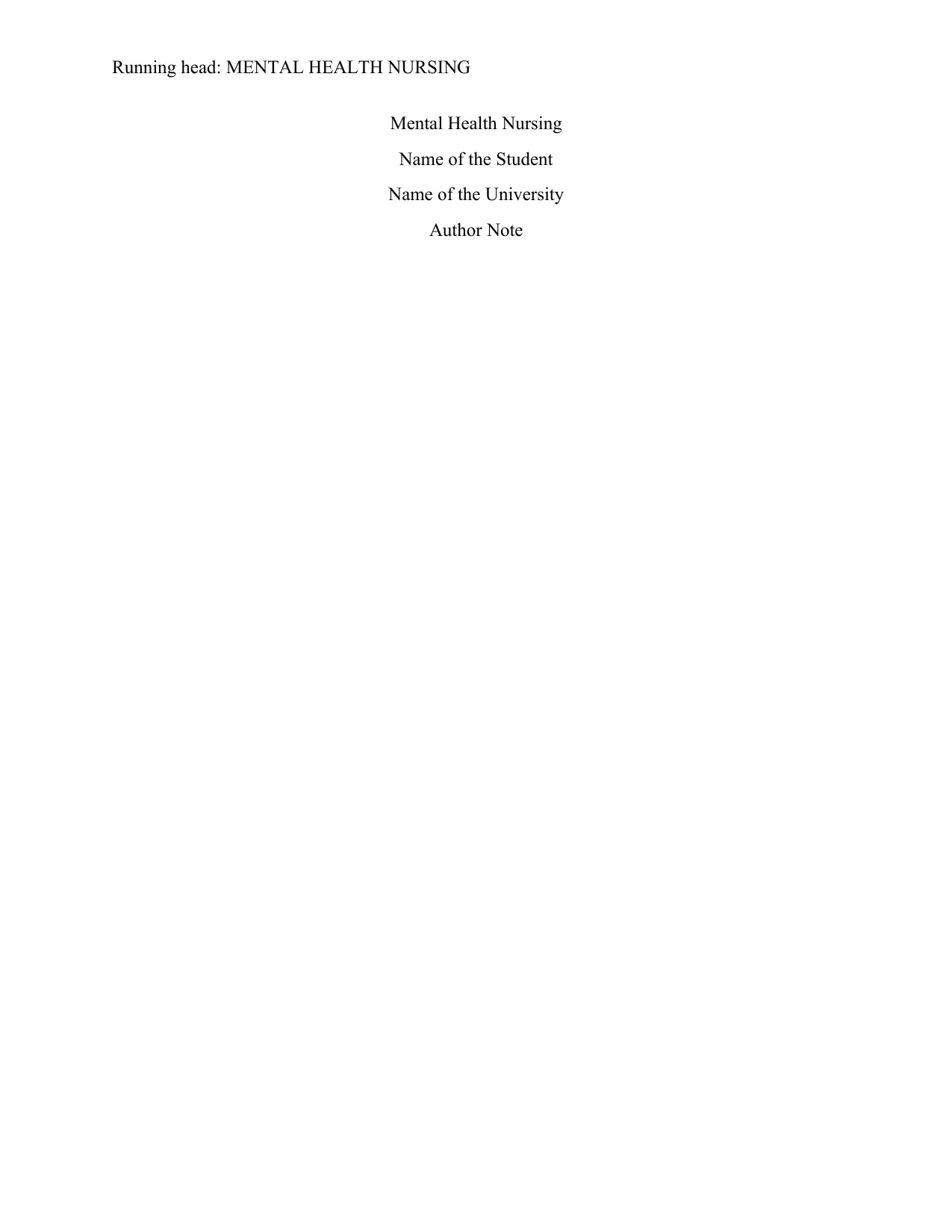
Running head: MENTAL HEALTH NURSING
Mental Health Nursing
Name of the Student
Name of the University
Author Note
Mental Health Nursing
Name of the Student
Name of the University
Author Note
Paraphrase This Document
Need a fresh take? Get an instant paraphrase of this document with our AI Paraphraser
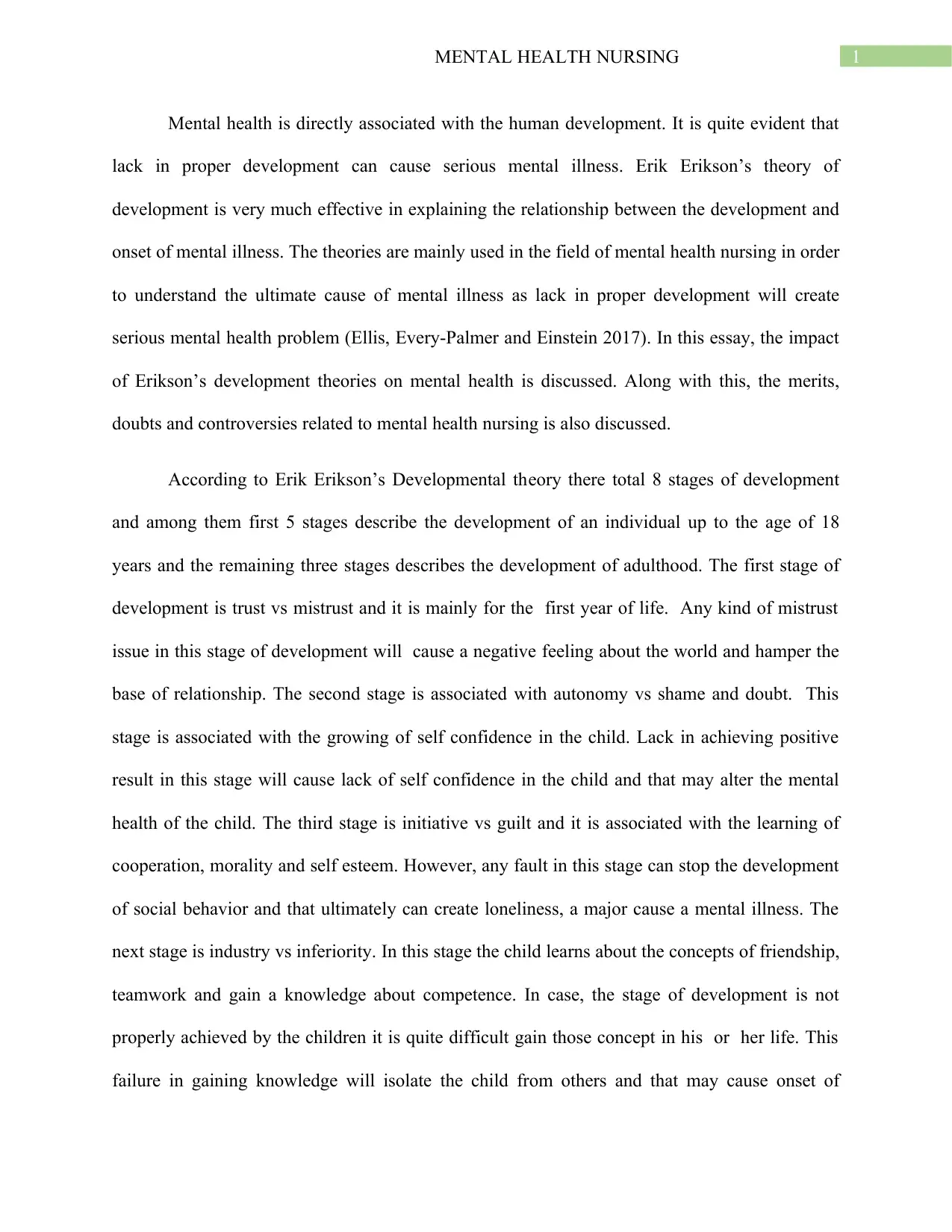
1MENTAL HEALTH NURSING
Mental health is directly associated with the human development. It is quite evident that
lack in proper development can cause serious mental illness. Erik Erikson’s theory of
development is very much effective in explaining the relationship between the development and
onset of mental illness. The theories are mainly used in the field of mental health nursing in order
to understand the ultimate cause of mental illness as lack in proper development will create
serious mental health problem (Ellis, Every-Palmer and Einstein 2017). In this essay, the impact
of Erikson’s development theories on mental health is discussed. Along with this, the merits,
doubts and controversies related to mental health nursing is also discussed.
According to Erik Erikson’s Developmental theory there total 8 stages of development
and among them first 5 stages describe the development of an individual up to the age of 18
years and the remaining three stages describes the development of adulthood. The first stage of
development is trust vs mistrust and it is mainly for the first year of life. Any kind of mistrust
issue in this stage of development will cause a negative feeling about the world and hamper the
base of relationship. The second stage is associated with autonomy vs shame and doubt. This
stage is associated with the growing of self confidence in the child. Lack in achieving positive
result in this stage will cause lack of self confidence in the child and that may alter the mental
health of the child. The third stage is initiative vs guilt and it is associated with the learning of
cooperation, morality and self esteem. However, any fault in this stage can stop the development
of social behavior and that ultimately can create loneliness, a major cause a mental illness. The
next stage is industry vs inferiority. In this stage the child learns about the concepts of friendship,
teamwork and gain a knowledge about competence. In case, the stage of development is not
properly achieved by the children it is quite difficult gain those concept in his or her life. This
failure in gaining knowledge will isolate the child from others and that may cause onset of
Mental health is directly associated with the human development. It is quite evident that
lack in proper development can cause serious mental illness. Erik Erikson’s theory of
development is very much effective in explaining the relationship between the development and
onset of mental illness. The theories are mainly used in the field of mental health nursing in order
to understand the ultimate cause of mental illness as lack in proper development will create
serious mental health problem (Ellis, Every-Palmer and Einstein 2017). In this essay, the impact
of Erikson’s development theories on mental health is discussed. Along with this, the merits,
doubts and controversies related to mental health nursing is also discussed.
According to Erik Erikson’s Developmental theory there total 8 stages of development
and among them first 5 stages describe the development of an individual up to the age of 18
years and the remaining three stages describes the development of adulthood. The first stage of
development is trust vs mistrust and it is mainly for the first year of life. Any kind of mistrust
issue in this stage of development will cause a negative feeling about the world and hamper the
base of relationship. The second stage is associated with autonomy vs shame and doubt. This
stage is associated with the growing of self confidence in the child. Lack in achieving positive
result in this stage will cause lack of self confidence in the child and that may alter the mental
health of the child. The third stage is initiative vs guilt and it is associated with the learning of
cooperation, morality and self esteem. However, any fault in this stage can stop the development
of social behavior and that ultimately can create loneliness, a major cause a mental illness. The
next stage is industry vs inferiority. In this stage the child learns about the concepts of friendship,
teamwork and gain a knowledge about competence. In case, the stage of development is not
properly achieved by the children it is quite difficult gain those concept in his or her life. This
failure in gaining knowledge will isolate the child from others and that may cause onset of
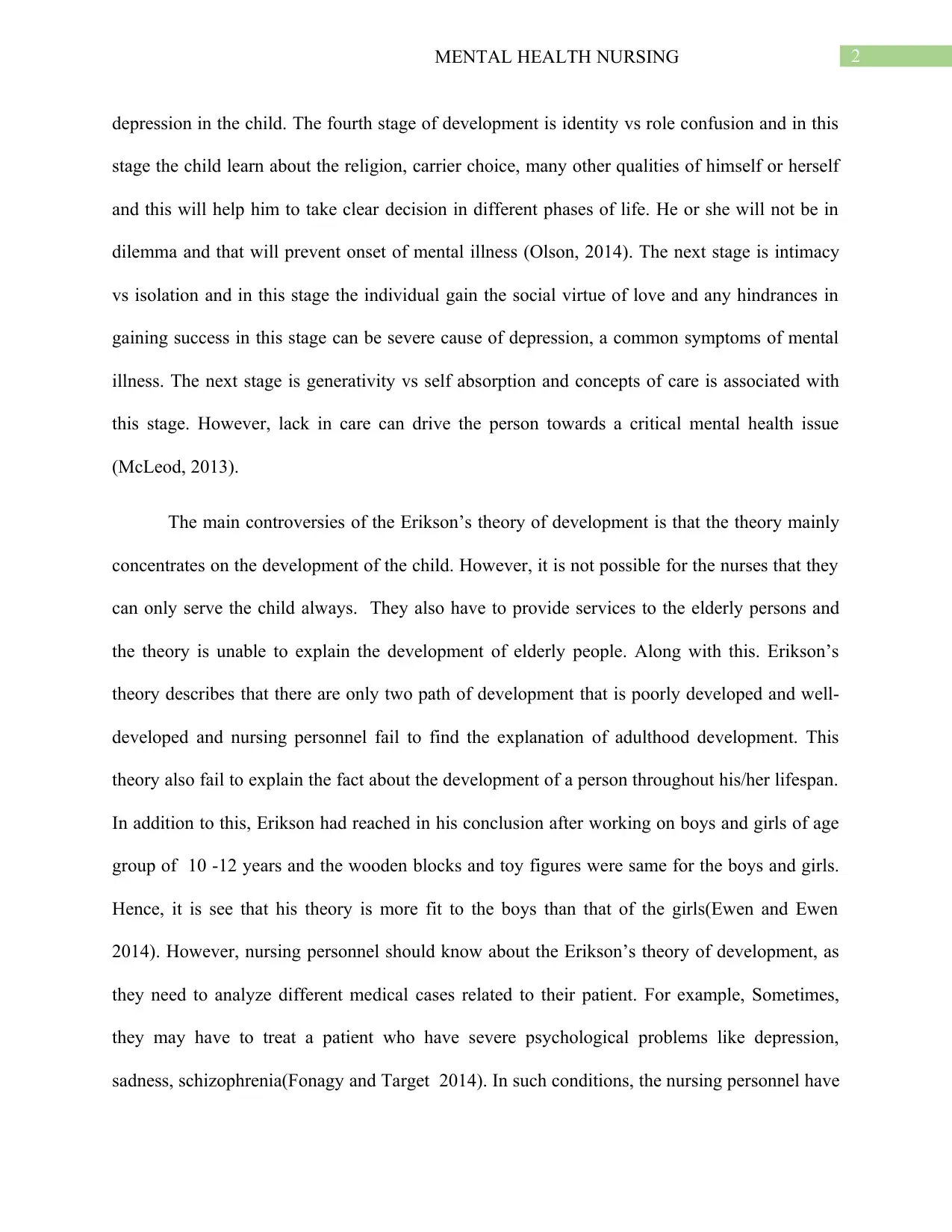
2MENTAL HEALTH NURSING
depression in the child. The fourth stage of development is identity vs role confusion and in this
stage the child learn about the religion, carrier choice, many other qualities of himself or herself
and this will help him to take clear decision in different phases of life. He or she will not be in
dilemma and that will prevent onset of mental illness (Olson, 2014). The next stage is intimacy
vs isolation and in this stage the individual gain the social virtue of love and any hindrances in
gaining success in this stage can be severe cause of depression, a common symptoms of mental
illness. The next stage is generativity vs self absorption and concepts of care is associated with
this stage. However, lack in care can drive the person towards a critical mental health issue
(McLeod, 2013).
The main controversies of the Erikson’s theory of development is that the theory mainly
concentrates on the development of the child. However, it is not possible for the nurses that they
can only serve the child always. They also have to provide services to the elderly persons and
the theory is unable to explain the development of elderly people. Along with this. Erikson’s
theory describes that there are only two path of development that is poorly developed and well-
developed and nursing personnel fail to find the explanation of adulthood development. This
theory also fail to explain the fact about the development of a person throughout his/her lifespan.
In addition to this, Erikson had reached in his conclusion after working on boys and girls of age
group of 10 -12 years and the wooden blocks and toy figures were same for the boys and girls.
Hence, it is see that his theory is more fit to the boys than that of the girls(Ewen and Ewen
2014). However, nursing personnel should know about the Erikson’s theory of development, as
they need to analyze different medical cases related to their patient. For example, Sometimes,
they may have to treat a patient who have severe psychological problems like depression,
sadness, schizophrenia(Fonagy and Target 2014). In such conditions, the nursing personnel have
depression in the child. The fourth stage of development is identity vs role confusion and in this
stage the child learn about the religion, carrier choice, many other qualities of himself or herself
and this will help him to take clear decision in different phases of life. He or she will not be in
dilemma and that will prevent onset of mental illness (Olson, 2014). The next stage is intimacy
vs isolation and in this stage the individual gain the social virtue of love and any hindrances in
gaining success in this stage can be severe cause of depression, a common symptoms of mental
illness. The next stage is generativity vs self absorption and concepts of care is associated with
this stage. However, lack in care can drive the person towards a critical mental health issue
(McLeod, 2013).
The main controversies of the Erikson’s theory of development is that the theory mainly
concentrates on the development of the child. However, it is not possible for the nurses that they
can only serve the child always. They also have to provide services to the elderly persons and
the theory is unable to explain the development of elderly people. Along with this. Erikson’s
theory describes that there are only two path of development that is poorly developed and well-
developed and nursing personnel fail to find the explanation of adulthood development. This
theory also fail to explain the fact about the development of a person throughout his/her lifespan.
In addition to this, Erikson had reached in his conclusion after working on boys and girls of age
group of 10 -12 years and the wooden blocks and toy figures were same for the boys and girls.
Hence, it is see that his theory is more fit to the boys than that of the girls(Ewen and Ewen
2014). However, nursing personnel should know about the Erikson’s theory of development, as
they need to analyze different medical cases related to their patient. For example, Sometimes,
they may have to treat a patient who have severe psychological problems like depression,
sadness, schizophrenia(Fonagy and Target 2014). In such conditions, the nursing personnel have
⊘ This is a preview!⊘
Do you want full access?
Subscribe today to unlock all pages.

Trusted by 1+ million students worldwide
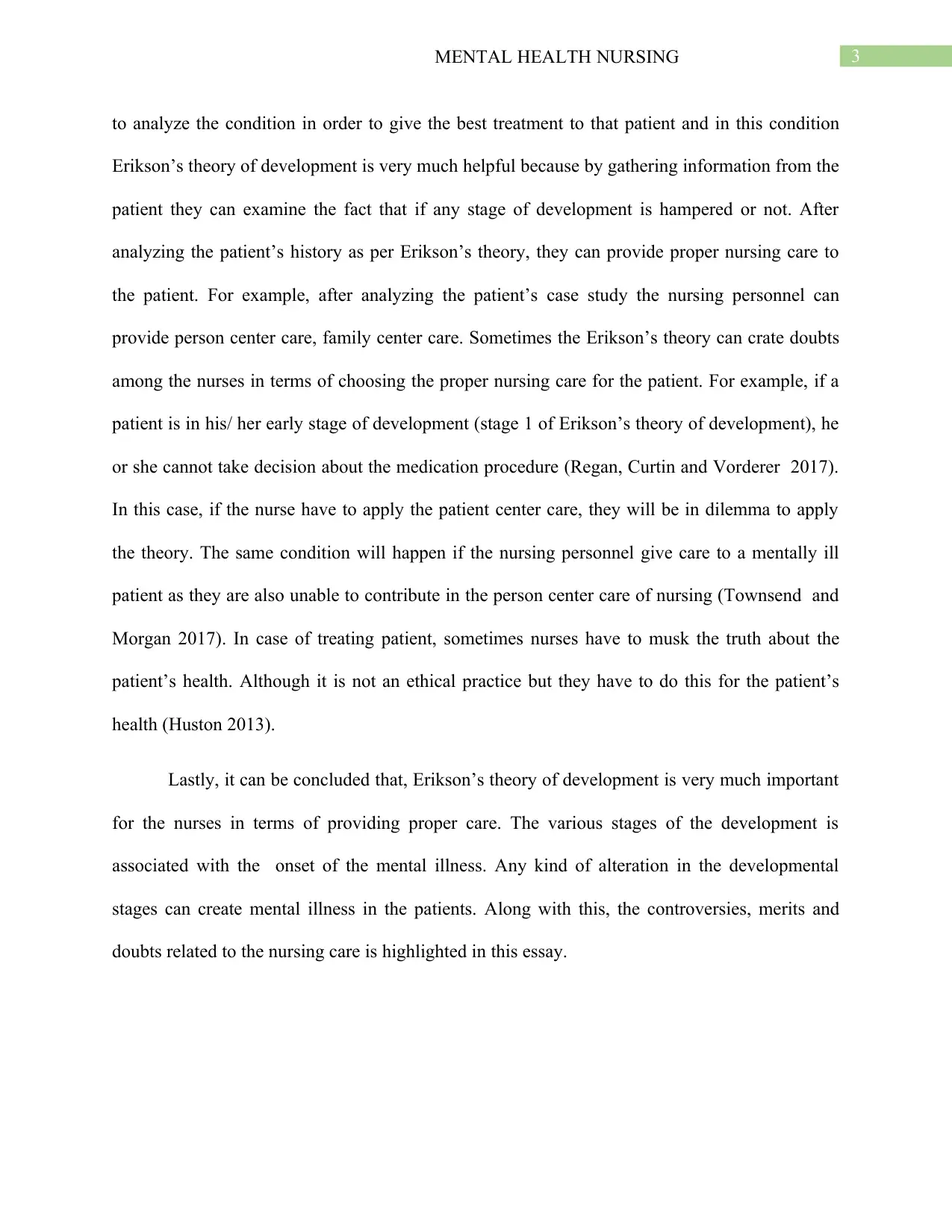
3MENTAL HEALTH NURSING
to analyze the condition in order to give the best treatment to that patient and in this condition
Erikson’s theory of development is very much helpful because by gathering information from the
patient they can examine the fact that if any stage of development is hampered or not. After
analyzing the patient’s history as per Erikson’s theory, they can provide proper nursing care to
the patient. For example, after analyzing the patient’s case study the nursing personnel can
provide person center care, family center care. Sometimes the Erikson’s theory can crate doubts
among the nurses in terms of choosing the proper nursing care for the patient. For example, if a
patient is in his/ her early stage of development (stage 1 of Erikson’s theory of development), he
or she cannot take decision about the medication procedure (Regan, Curtin and Vorderer 2017).
In this case, if the nurse have to apply the patient center care, they will be in dilemma to apply
the theory. The same condition will happen if the nursing personnel give care to a mentally ill
patient as they are also unable to contribute in the person center care of nursing (Townsend and
Morgan 2017). In case of treating patient, sometimes nurses have to musk the truth about the
patient’s health. Although it is not an ethical practice but they have to do this for the patient’s
health (Huston 2013).
Lastly, it can be concluded that, Erikson’s theory of development is very much important
for the nurses in terms of providing proper care. The various stages of the development is
associated with the onset of the mental illness. Any kind of alteration in the developmental
stages can create mental illness in the patients. Along with this, the controversies, merits and
doubts related to the nursing care is highlighted in this essay.
to analyze the condition in order to give the best treatment to that patient and in this condition
Erikson’s theory of development is very much helpful because by gathering information from the
patient they can examine the fact that if any stage of development is hampered or not. After
analyzing the patient’s history as per Erikson’s theory, they can provide proper nursing care to
the patient. For example, after analyzing the patient’s case study the nursing personnel can
provide person center care, family center care. Sometimes the Erikson’s theory can crate doubts
among the nurses in terms of choosing the proper nursing care for the patient. For example, if a
patient is in his/ her early stage of development (stage 1 of Erikson’s theory of development), he
or she cannot take decision about the medication procedure (Regan, Curtin and Vorderer 2017).
In this case, if the nurse have to apply the patient center care, they will be in dilemma to apply
the theory. The same condition will happen if the nursing personnel give care to a mentally ill
patient as they are also unable to contribute in the person center care of nursing (Townsend and
Morgan 2017). In case of treating patient, sometimes nurses have to musk the truth about the
patient’s health. Although it is not an ethical practice but they have to do this for the patient’s
health (Huston 2013).
Lastly, it can be concluded that, Erikson’s theory of development is very much important
for the nurses in terms of providing proper care. The various stages of the development is
associated with the onset of the mental illness. Any kind of alteration in the developmental
stages can create mental illness in the patients. Along with this, the controversies, merits and
doubts related to the nursing care is highlighted in this essay.
Paraphrase This Document
Need a fresh take? Get an instant paraphrase of this document with our AI Paraphraser
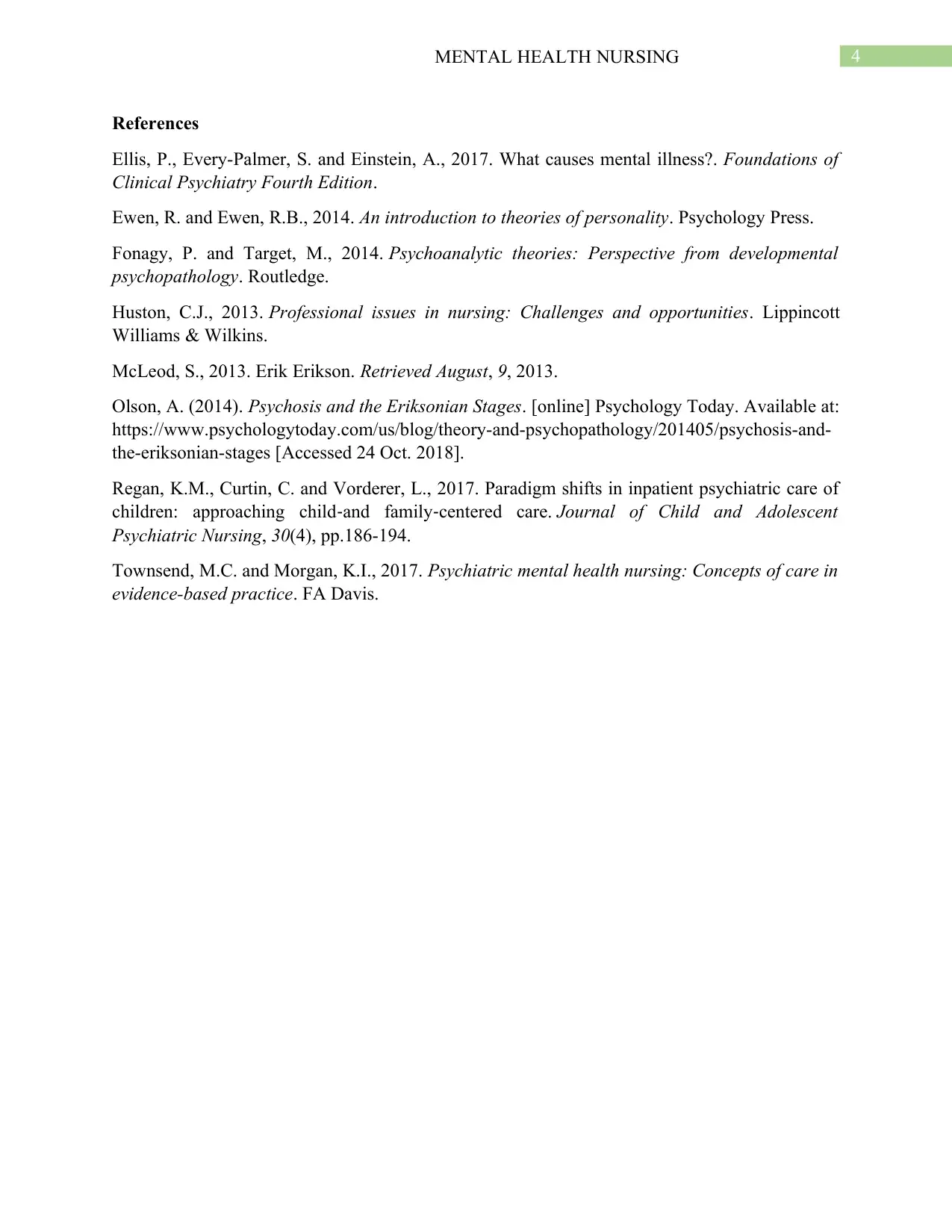
4MENTAL HEALTH NURSING
References
Ellis, P., Every-Palmer, S. and Einstein, A., 2017. What causes mental illness?. Foundations of
Clinical Psychiatry Fourth Edition.
Ewen, R. and Ewen, R.B., 2014. An introduction to theories of personality. Psychology Press.
Fonagy, P. and Target, M., 2014. Psychoanalytic theories: Perspective from developmental
psychopathology. Routledge.
Huston, C.J., 2013. Professional issues in nursing: Challenges and opportunities. Lippincott
Williams & Wilkins.
McLeod, S., 2013. Erik Erikson. Retrieved August, 9, 2013.
Olson, A. (2014). Psychosis and the Eriksonian Stages. [online] Psychology Today. Available at:
https://www.psychologytoday.com/us/blog/theory-and-psychopathology/201405/psychosis-and-
the-eriksonian-stages [Accessed 24 Oct. 2018].
Regan, K.M., Curtin, C. and Vorderer, L., 2017. Paradigm shifts in inpatient psychiatric care of
children: approaching child‐and family‐centered care. Journal of Child and Adolescent
Psychiatric Nursing, 30(4), pp.186-194.
Townsend, M.C. and Morgan, K.I., 2017. Psychiatric mental health nursing: Concepts of care in
evidence-based practice. FA Davis.
References
Ellis, P., Every-Palmer, S. and Einstein, A., 2017. What causes mental illness?. Foundations of
Clinical Psychiatry Fourth Edition.
Ewen, R. and Ewen, R.B., 2014. An introduction to theories of personality. Psychology Press.
Fonagy, P. and Target, M., 2014. Psychoanalytic theories: Perspective from developmental
psychopathology. Routledge.
Huston, C.J., 2013. Professional issues in nursing: Challenges and opportunities. Lippincott
Williams & Wilkins.
McLeod, S., 2013. Erik Erikson. Retrieved August, 9, 2013.
Olson, A. (2014). Psychosis and the Eriksonian Stages. [online] Psychology Today. Available at:
https://www.psychologytoday.com/us/blog/theory-and-psychopathology/201405/psychosis-and-
the-eriksonian-stages [Accessed 24 Oct. 2018].
Regan, K.M., Curtin, C. and Vorderer, L., 2017. Paradigm shifts in inpatient psychiatric care of
children: approaching child‐and family‐centered care. Journal of Child and Adolescent
Psychiatric Nursing, 30(4), pp.186-194.
Townsend, M.C. and Morgan, K.I., 2017. Psychiatric mental health nursing: Concepts of care in
evidence-based practice. FA Davis.
1 out of 5
Related Documents
Your All-in-One AI-Powered Toolkit for Academic Success.
+13062052269
info@desklib.com
Available 24*7 on WhatsApp / Email
![[object Object]](/_next/static/media/star-bottom.7253800d.svg)
Unlock your academic potential
Copyright © 2020–2026 A2Z Services. All Rights Reserved. Developed and managed by ZUCOL.





